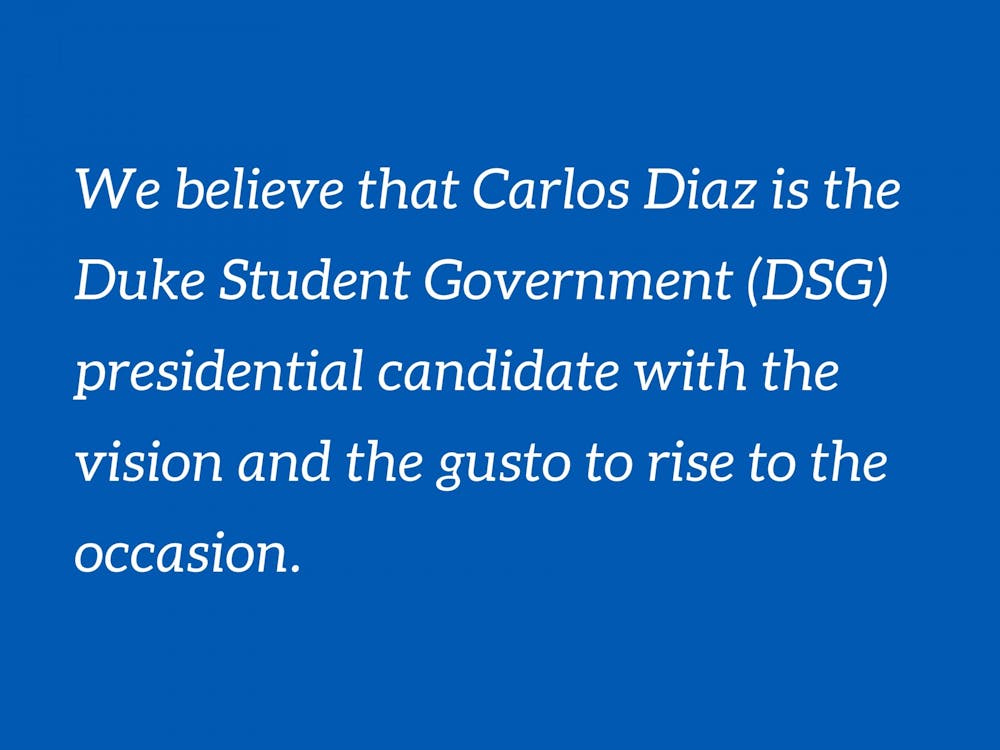This year, the Editorial Board has largely focused on questioning power structures at Duke. We have covered the cyclical nature of legacy admissions, the toxic elitism in club culture, instances of white apathy outside of electoral politics, and more. The challenges that the Duke student body has faced this year have illuminated the urgency for abandoning status quos. We believe that Carlos Diaz is the Duke Student Government (DSG) presidential candidate with the vision and the gusto to rise to the occasion.
The president’s influence over DSG’s culture and the wellbeing of the student body cannot be overstated. Admittedly, here lies candidate Christina Wang’s strengths—she is more than familiar with DSG bureaucracy and won’t face a steep learning curve if elected president. She began her DSG career during her freshman year, serving as a senator on the Equity and Outreach committee, and has risen through ranks since. Despite this strong affiliation, Christina will tell you that DSG does not have the strongest track record and has considerable room to improve. We believe that Christina has the background to provide steps towards institutionalizing equity and building a greater sense of community—two of her primary goals—however, we believe she will only work within the lines set out by the Duke administration. In other words, she is too safe of a choice given the urgent needs of the student body.
The difference between these two candidates mimics the perpetual struggle between safe, incremental change and unconventional, sizable progress. Carlos takes the latter approach. We believe the largest risk in electing him as president would be the learning curve he would face, as it would be his first executive DSG position. However, he has worked with DSG throughout his time at Duke while advocating on behalf of Mi Gente as President and serving on the DSG Latinx Caucus, which renders his inexperience strictly to the internal workings of DSG. We are confident that Carlos has the drive and talent to overcome this initial hurdle. Moreover, we strongly believe that his bold policies and deep understanding of the needs of the student body are worth the risk of electing a non-traditional DSG president.
Given his outsider status, Carlos is not shy in expressing his discontent with DSG, specifically their patterns of underutilizing resources and ignoring connections with student organizations. He addresses these issues in his proposals to remove bias in the senatorial recruitment process and reform their project model. Beyond that, he backs traditional campaign buzzwords—“equity,” “transparency,” and “accessibility”—with unconventional policies and genuine enthusiasm to do better. It is evident that accountability flows both ways for Carlos, as he was quick to admit when he was unaware of a student’s specific policy concern during our conversation.
We endorse Carlos Diaz because we feel that his bold attitude and platform will push DSG out of its comfort zone. Speaking with Carlos makes us wonder how different this year’s administrative policies—sparse mental wellness days, abrupt housing changes, and lackluster social life reform—would be if someone with his unwavering equitable priorities had greater influence in these decision-making processes. His history with equitable advocacy and vision for a better Duke community makes us hopeful that, as DSG president, he will be a fierce champion of the student body.
The Community Editorial Board is independent from the editorial staff of the Chronicle. Their column runs on alternate Mondays.
Editor’s Note: Kristen Tan has recused herself from this editorial.
Get The Chronicle straight to your inbox
Signup for our weekly newsletter. Cancel at any time.

